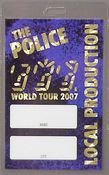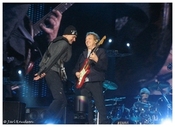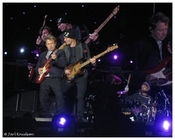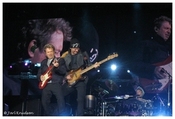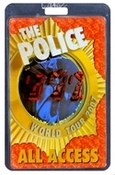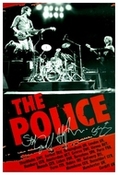
Boring Sting walked in his own footsteps...
The Police reinterpreted old hits with dignity, but also without the zeal and nervousness that adorned the trio in the late 1970s.
No horn section. No choir to lift it all up. No spectacular guest soloists or a mighty keyboard equipment in the background. The Police are in Aarhus like the trio The Police, who said goodbye and thank you at the peak of their success 24 years ago. Neither more nor less. Is that enough? Can the songs from that time plus some lights and graphics carry a concert for 40,000 people?
Up in front of the stage everything is going well. Swinging on wood chips, I reach as far up to Sting and co. as I can in the crowd, and notice that the first rows of spectators are happy. They are jumping and clapping. In the middle of the crowd there is generally a nice atmosphere.
But if you slide out to the periphery or down behind, the sound is problematic. It is low and muddy. And some people have to listen to it in that version.
At a concert this big, you have to be lucky to get good seats. In this case, a large part of the audience has pulled a rivet because the organizers have not made sure in advance that the sound is in order.
At the same time, the organizers have overestimated that a restored group like The Police would make people gape in amazement as soon as the music started.
Reunions of disbanded bands are a debatable affair. Sometimes the motive is lack of money, and in many cases only a few members of the original band are alive or present when a comeback is made.
The revival of The Police is different. The group's line-up is intact. And although the group's comeback is a lucrative business, it can hardly be an empty coffin that has sent bass-playing millionaire Sting back on the road with drummer Stewart Copeland and guitarist Andy Summers a full 24 years after the three last performed together.
Maybe Sting just wants to play a little again with the old buddies who made him famous in the first place?
In any case, the tour presents The Police exactly as they were in the years from 1977 to 1984: three technically sound, British musicians with a common love of jazz, pop and ska. When they were young, they conquered an ever-growing audience in the US, Europe and Australia with each album, before they tired of each other, and Sting in particular had ambitions in other directions.
In 1983, The Police's last studio album, 'Synchronicity', was released, which included the hit 'Every Breath You Take'. The album cemented the group's status as one of the best-selling names at the time. In other words, The Police were a trio at the top when they disbanded in 1984. They never had a downturn.
It is against this background that The Police are touring again. With fans behind them from the start of the tour in Vancouver to a city like Aarhus and further around the world for half a year. The majority of the 40,000 people at Vestereng in Aarhus are old enough to know the group's studio albums from when they were released. The Police know this.
Several times, with a wry smile, Sting encourages the audience to sing along to hits like 'De Do Do Do De Da Da Da', 'Roxanne' and 'Every Little Thing She Does Is Magic'. He seems absolutely confident in standing in front of old acquaintances. He looks like a man who has success at home in advance.
Unlike a number of other groups, The Police do not risk losing their reputation by going on a comeback tour. They play and sing just as competently on stage as when the world first got to know Sting's whitewashed reggae.
The concerts are sold out in many places. 40,000 in front of the stage in Aarhus is a much-talked-about deficit, but the audience figure is not small on top of a year when The Rolling Stones, Genesis, The Who, Elton John and other storied stadium rock names have already been here. Especially considering the relatively expensive ticket prices in Denmark.
The biggest problem on the stage in Aarhus on Saturday night is that The Police have nothing to lose or gain. They don't have to convince uninformed ears that they are worth listening to.
The three men with Sting as the frontman just have to come up with a set based on the old hits. Then everything is almost like the old days, when the strange, spacious genre term new wave was the big thing, and when Sting had not yet become the singing superman of perfectionism, who masters everything from soul to 16th century lute music, but tends to give the whole thing the characteristic smooth Sting layer.
Don't get me wrong. I like Sting. This uniquely singing, British vegetarian, who is well-versed, holds his own and could easily be a male model on the cover of a yoga instruction book or a guide to sensitive sex.
It's liberating that Sting doesn't live up to rock music's romantic cliché that if you're a real rock man, you live to the edge of the risk of dying young as a very rotten person inside. I especially like Sting when he really challenges himself and the rest of us. If he doesn't do that, he becomes boring.
And unfortunately, he occasionally stays in Aarhus with the rest of The Police. It is preserved; the band has rearranged many of the songs. 'Roxanne' is expanded with long solos for Andy Summer's aimless curl guitar. 'Hole In My Life' has, bizarrely enough, an interlude from 'Hit the Road Jack'. As if you are standing in a jukebox. Light and images constantly change moods.
There are graphics a la 1980s with bright colours, there are beautiful cascades of complementary light, and funnily enough (or even self-ironic?) there are also images of walking dinosaurs while 'Walking in Your Footsteps' is played.
'At vander i jeres fodspror.' That's what The Police are doing tonight in Aarhus. But something is missing compared to when The Police was a new, interesting name. Back then, there was an eagerness to conquer the world and an adrenaline-pumping nervousness in the expression.
It wasn't 'just' a straight-up pop hit. The jazz inspiration varied the melodies atypically, and the borrowing of ska music's persistent, breathless rhythm was the physicality of The Police's music. In addition, the young Sting's vocals had something uncertain, hectic and unfinished about them in the high notes at the beginning.
A quarter of a century later, The Police's interpretations of the old songs are considerably more laid-back. Sometimes to such an extent that they have to be careful not to fall over. In the members' solos, they spread out, but they don't stick out, they don't deviate for a second from the schedule that has been laid out in advance.
And then they have relatively little impact if you move from the first, enthusiastic rows of the audience to Vestereng's people at the back. The further away from the stage you get, the more you have to look for a place where the sound is just okay.
The tour with The Police is a worthy, but also very past-dependent comeback.
It's nice that the group refrains from inflating the music with keyboards, horns and choirs that could have shifted the attention from the trio to the packaging.
It's not so cool, Aarhus seems like another day at work for men who already have everything they wanted, and are now just leafing through a sound response to a photo album.
(c) Politiken by Dorte Hygum Sørensen
September 1, 2007
SET LIST
- Message In A Bottle
- Synchronicity II
- Walking On The Moon
- Voices Inside My Head
- When The World Is Running Down You Make The Best Of What's Still Around
- Don't Stand So Close To Me
- Driven To Tears
- Truth Hits Everybody
- Hole In My Life
- Every Little Thing She Does Is Magic
- Wrapped Around Your Finger
- De Do Do Do, De Da Da Da
- Invisible Sun
- Walking In Your Footsteps
- Can't Stand Losing You
- Roxanne
- King Of Pain
- So Lonely
- Every Breath You Take
- Next To You

